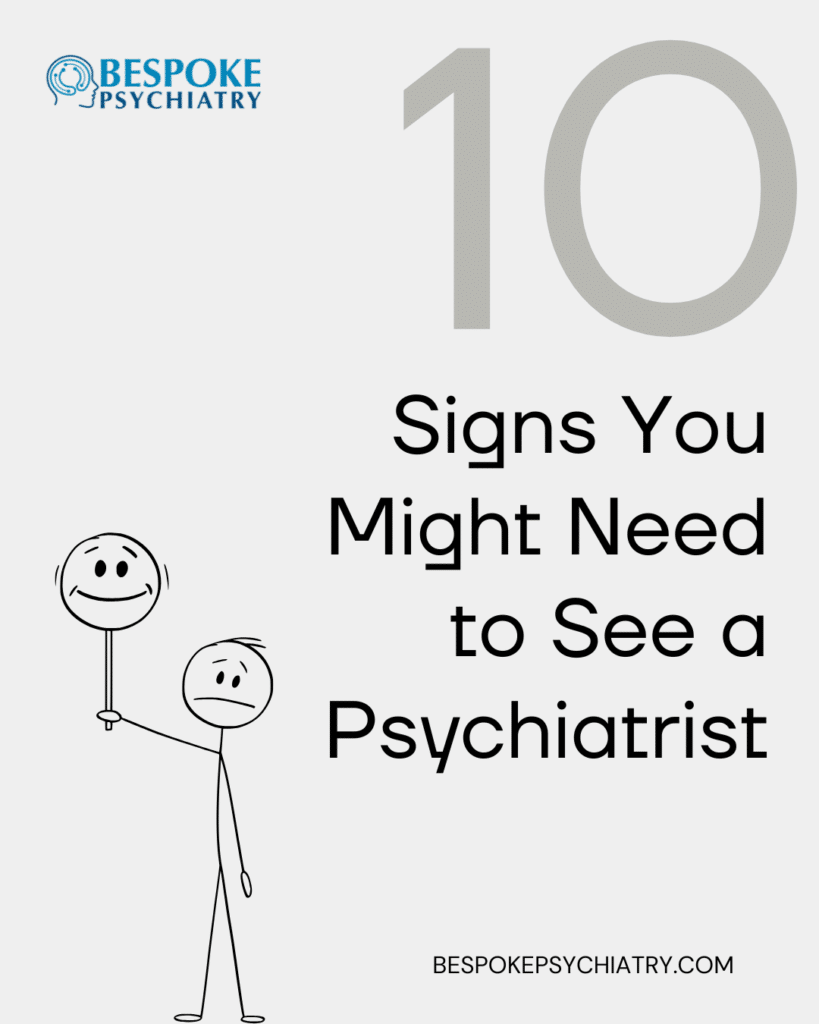
Mental health is just as important as physical health, yet many people hesitate to seek professional help. If you’re struggling with emotional, behavioral, or cognitive issues, seeing a psychiatrist could be a crucial step toward recovery. Here are some key signs that indicate it may be time to consult a psychiatrist. Click HERE to become a new patient.
1. Persistent Sadness or Anxiety
If you’ve been feeling down, hopeless, or anxious for weeks or months, it could be more than just a passing phase. Conditions like depression and generalized anxiety disorder often require professional intervention, especially if they are affecting your daily life.
2. Difficulty Managing Daily Tasks
When mental health issues start interfering with work, school, or relationships, it’s a sign that professional help may be needed. If you’re struggling to focus, complete tasks, or maintain responsibilities, a psychiatrist can help identify the underlying cause and develop a treatment plan.
3. Sudden or Extreme Mood Swings
Frequent mood swings, especially those that seem uncontrollable, can be a sign of mood disorders such as bipolar disorder. If you experience periods of extreme happiness followed by deep lows, a psychiatrist can assess whether mood stabilization treatments may be necessary.
4. Changes in Sleep Patterns
Insomnia, excessive sleep, or frequent nightmares can be linked to mental health conditions like anxiety, PTSD, or depression. If sleep disturbances are affecting your well-being, a psychiatrist can help diagnose and treat the underlying issue.
5. Uncontrollable Worry or Fear
Excessive worry, irrational fears, or constant feelings of dread may indicate an anxiety disorder. If your fears are interfering with your ability to function normally, seeking psychiatric support can help manage them through therapy, medication, or lifestyle changes.
6. Thoughts of Self-Harm or Suicide
If you have thoughts of self-harm or suicide, it’s crucial to seek immediate help. A psychiatrist can provide crisis intervention and long-term treatment to help you regain a sense of control and hope.
7. Unhealthy Coping Mechanisms
Turning to alcohol, drugs, excessive food consumption, or self-isolation to cope with stress or emotions can be a sign of deeper mental health struggles. Psychiatrists specialize in helping people develop healthier ways to manage their emotions.
8. Traumatic Experiences That Affect Your Daily Life
If past trauma—such as abuse, the loss of a loved one, or a major life change—is affecting your mental and emotional well-being, professional support can be essential in processing and healing from these experiences.
9. Struggles with Reality (Hallucinations or Paranoia)
Hearing voices, seeing things that aren’t there, or experiencing paranoia can be symptoms of conditions such as schizophrenia or severe anxiety. A psychiatrist can evaluate your symptoms and recommend appropriate treatments.
10. Relationship or Social Difficulties
If you find it difficult to connect with others, manage conflicts, or maintain friendships, underlying mental health conditions like social anxiety, depression, or personality disorders may be at play. A psychiatrist can help identify these issues and provide guidance on how to navigate them.
When to Seek Help
If you recognize any of these signs in yourself or a loved one, seeking professional support can make a significant difference. Psychiatry offers a range of treatment options, including therapy, medication, and holistic approaches to improve mental well-being.
Need Support?
If you’re unsure where to start, consider booking a consultation with a bespoke psychiatrist who tailors treatment to your unique needs. Contact Bespoke Psychiatry today to book an appointment with one of our expert providers or psychiatrists and start your journey toward a happier, healthier you. Personalized mental health care can provide the targeted support necessary to help you feel better and regain control of your life.For more resources and mental health support, or to schedule a consultation, visit Bespoke Psychiatry’s website.



